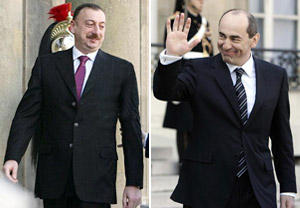The failure of the negotiations in France on the Karbagh conflict was predictable and it proves once more that the parties are still not ready for compromises. At the same time it doesn’t matter which party stopped the negotiations. What difference does it make which party has suggested first to “finalize the results” if there are no results at all?
This is the current situation: the parties don’t try to reach an agreement, but try to stop the process by throwing the blame on the other party. For instance Azerbaijan announces that the issue of the territorial integrity of their country can’t be discussed. After such announcements the negotiation process becomes nonsense and Azerbaijan knows this very well. On the other hand Armenia announces that Karabakh must take part in the negotiation process. Question: is there any chance that something good willcome out of a negotiation process that involves three parties? In fact there is no difference if we look at it from the negotiations perspective. The only difference is that if Karabakh is recognized as part of the negotiation process, later in case of failure, Armenia will be stronger than it is now. This means that in this case our aim is not to resolve the conflict, but to keep ourselves strong in this phase.
So why do the authorities of Azerbaijan and Armenia want to prolong the process of negotiations? We can understand why Azerbaijan is doing this: that country doesn’t get losses in the status of “neither war, nor peace” (or they think that they don’t lose). Azerbaijan is not left out of the regional integration processes and they hope that they will be able to make their army stronger with the money received from oil and Karabakh. This is the reason they have a unique approach in international practice: when the defeated party makes ultimatums at the table of negotiations. At the same time this is the approach of everyone in Azerbaijan.
As for the Armenian side, there are two views in our political field. First, foreign countries advocate the principle of territorial integrity and this approach will not change anytime soon. This means that the world, from the objective point of view, advocates Azerbaijan. Accordingly it will be better to reach a final agreement now before the world hasn’t changed its approach and Azerbaijan has not become stronger. And the second point is that foreign countries really advocate the principle of territorial integrity, but this may change in the future. We should delay the negotiation process and wait for the right time. At the same time, must do our best not to let Azerbaijan get any stronger.
But it would be better if the Minsk group co-chairmen find out exactly how Azerbaijan is going to provide a “high level sovereignty” for Karabakh if the Constitution of Azerbaijan doesn’t say such a thing. They’d also better find out which country allows a referendum in Karabagh.

